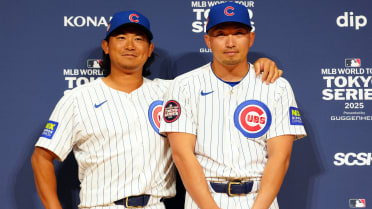Senga enters sophomore campaign with Cy Young aspirations
PORT ST. LUCIE, Fla. -- When Kodai Senga arrived in the Majors last season, he was slated -- if things went well -- to be the clear No. 3 on a Mets staff headlined by expected future Hall of Famers Max Scherzer and Justin Verlander. Before six months passed, however, Scherzer was gone, Verlander was gone and Senga was left as the team’s ace by default.
Now, following the Mets' unsuccessful bid to bring his countryman Yoshinobu Yamamoto into the fold, Senga is again the clear No. 1 of this staff. The team’s hopes of a playoff run depend in large part upon him pitching like it.
“I think the fact that I’m getting these types of questions means that some other people out there might think of me that way,” Senga said through an interpreter when asked Wednesday about his ace status. “But that was the result of me just staying healthy and running through the season. I plan to do no different, just staying healthy and getting through ’24, and we’ll see what happens.”
On paper, there’s plenty to like about Senga heading into his sophomore campaign. As a rookie, Senga made the National League All-Star team and only improved from there, notably refining his control while going 6-2 with a 2.44 ERA from July through September. He garnered both Rookie of the Year and Cy Young votes. Spring concerns over Senga’s adjustment to American baseballs, American mounds and American culture proved unfounded; he aced all of that.
But there is also obvious room for growth. Specifically, the Mets leashed Senga throughout his rookie year, drawing up their pitching schedule specifically so he could make all but three of his 29 starts on five or more days rest. The shackles frustrated Senga, even though he understood their purpose: to help him adjust safely from a traditional, once-per-week Japanese pitching schedule to a once-every-five-games MLB routine. Given his druthers, Senga would have pitched more often. He didn’t like that other starters had to shift their schedules to accommodate him.
Yet it remains unclear how much more Senga might pitch. When asked, team officials indicate some level of interest in having him accumulate more than the 166 1/3 innings he threw last season. But they also generally demur on the subject.
“It’s going to be a lot of conversations,” manager Carlos Mendoza said. “It’s going to be day to day, not only with him but with [pitching coach Jeremy Hefner]. A lot of people are going to be involved with the decision-making as well, whether it’s his trainers, our trainers and all that. But it’s going to be fluid.”
Added Senga: “Obviously, we don’t know how the schedule is going to pan out with the off days or road days, what not. But whether it’s short rest or long rest, I plan to be ready for anything that comes my way.”
How much the Mets expand Senga’s workload could make the difference between a Cy Young-caliber season and a merely very good one. But they’ll cross those proverbial bridges later this spring. For now, Senga is focused on doing what he can to improve. He wants to enhance his control even more, after ranking 42nd out of 44 qualified Major League pitchers in walk rate last season. He hopes to blunt his home-road splits, which he attributed to an unfamiliarity with long flights and difficult Major League travel. Senga is even tweaking his arsenal a bit -- though that, he said, remains “a work in progress.”
Such is the benefit of being a second-year player, unconcerned with the novelty of a new country, a new culture, new foods, new experiences. All Senga has to contend with this year is a new management team, which is wholly focused on helping him -- as Mendoza put it -- “to be the best version of himself.”
“It’s definitely an environment that I’m used to,” Senga added. “I’ve been here already. I’m able to stay calm with throwing and working out, everything. I just want to get through Spring Training, the first two months healthy, and get into the season.
“It just comes down to making sure I can perform at the highest level.”
Senior Reporter Anthony DiComo has covered the Mets for MLB.com since 2007.




